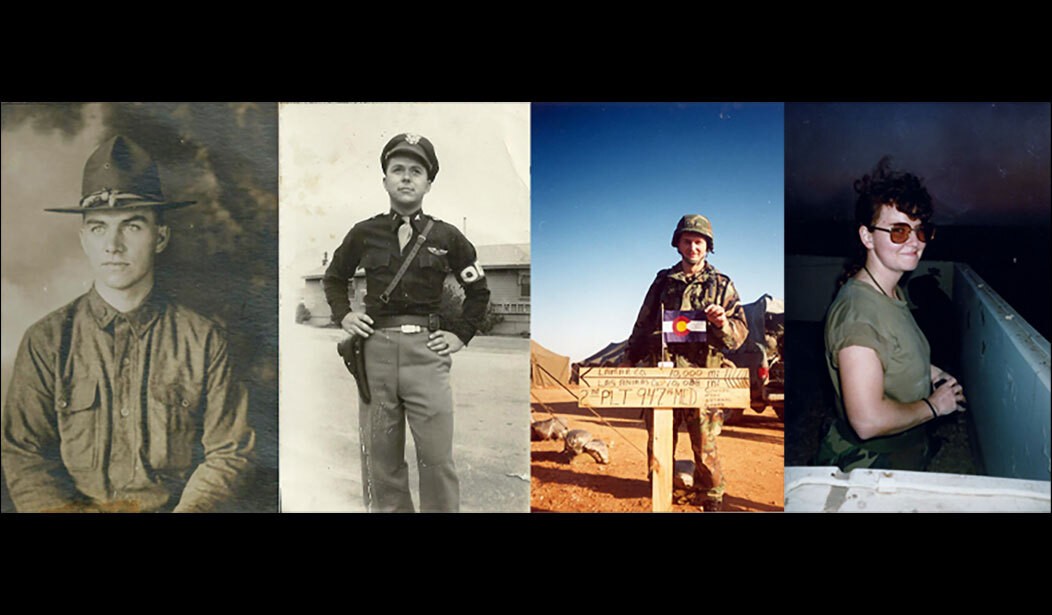Look at the image just above, and you'll see three generations of Army service: My grandfather, in his tight-collared uniform tunic and campaign hat, during his Great War service, my Dad, in his World War 2 officer's uniform complete with holstered .45, and me, somewhere in northern Saudi Arabia, near the border with Iraq and Kuwait. The final photo is of my wife, also in Saudi Arabia, just before our company moved up to the border.
None of us was Rambo. None of us were big heroes. We went where we were told to go and did what we were told to do. Of the four people in that photo, only two - my wife and I - deployed overseas, both for Operation Desert Storm. We were in a medical clearing company, which meant we were tasked with taking patients off ambulances, air and ground, stabilizing them enough to survive the flight to Germany (American and allied service members) or to be handed over to the Saudis (refugees, Iraqi and Kuwaiti civilians, prisoners of war.)
We've been doing a lot of war reporting lately. Between the Russo-Ukraine war and now the fighting between Iran and Israel, it's been a lively time, and it's hard to stay objective at times. But when writing and reading about war, sometimes people, especially people who haven't seen it first-hand, find it hard to appreciate what that's like. It's hard to understand the horrendous human cost. But I can lend a little personal experience to that; only a little, many of my brethren in arms have much more compelling tales, but these are mine.
In Desert Storm, we were close enough that some Scuds landed around us, but we were never in any direct, eye-to-eye combat. But we did go down the Highway of Death when Iraqi vehicles and tanks were still smoking, and the ground still littered with unspent ordinance; a great deal of caution was in order.
We picked our way slowly down the road. I saw an Iraqi T-62 on the shoulder of the road. It had clearly taken a missile hit to the engine compartment and burned; the tank was charred, the paint burned off, and oddly, likewise burned, a child's tricycle lay alongside one of the road wheels. The Iraqis, it seems, stole everything in Kuwait that wasn't nailed down. But being both a child of the Cold War and a naturally curious person, faced with an actual by-gosh Soviet tank, I decided, burned or not, to climb up.
The metal of the tank was cool to the touch. There was an odd smell, but no smoke. The hatches on the turret were open, so I climbed up, lowered myself into the tank commander's hatch, and crouched to see inside.
The crew was still in the tank.
I don't remember exiting the tank, but a couple of my motor pool guys who were checking vehicles nearby said I came out of that turret like a jack-in-the-box, shouting, "Don't anyone come up here!"
The Iraqi Army did some awful things in Kuwait. We saw enough and talked to enough Kuwaiti people to get a pretty good feel for it. But the crew of that tank... What a horrible, horrible way to go.
That experience, like all wars, could have been characterized as long, long spells of boredom interspersed with moments of frantic activity. But there are always some funny moments. After the famous 100 hours of ground combat ended with a cease-fire, we pulled back to Saudi Arabia, to a big Saudi installation called King Khalid Military City. Our company was assigned the task of holding sick call for U.S. troops, which most of the docs found pretty dull, but it was something to do. One of our platoons had as their admin officer a young, cute female lieutenant in whom I was by this point becoming very interested indeed (we've been married now for 33 years), and she routinely was the screening person for sick call attendees. One day, a young soldier came in complaining of a rash.
"Where is this rash?" the young, cute female officer asked.
"Uhm. Well. It's on my, uh, knee."
She sent him into one of the docs, a crusty old sort with an odd sense of humor, and when the doc determined that the word "knee" in the soldier's complaint should have been preceded with "wee," he shouted for that same young, cute lieutenant: "Lieutenant Travers! Get in here, I need your help."
See Also: New: Netanyahu Declares Israel 'On the Way to Victory' Over Iran
New: Iran Folds Like a Wash-and-Wear Suit, Starts Begging for a Ceasefire
Over the years, I've heard a lot of war stories and have told a few. (The difference between a fairy tale and a war story being that a fairy tale begins, "Once upon a time," and a war story begins, "No s***, there I was...") When I was 19-20, I rented an apartment from an old retired Army Colonel who had served in the Korean and Vietnam wars and who had a big case full of decorations, including a Silver Star, a Bronze Star with two clusters, and three Purple Hearts. This guy really was a hero, and while many old combat veterans won't talk about their experiences, he did, at length, with his stories ranging from killing three North Korean soldiers with a bayonet in a muddy trench in the middle of the night to seeing the rack and ruin that was visited on villages in Vietnam - and of the friends and brothers he lost in those wars.
As we read about the fighting going on now in various parts of the world, as we carefully analyze the tactics, the strategy, and the logistics of those wars, and try to make well-thought-out guesses as to what will happen next, it's appropriate to take a moment now and then to consider the horrendous human cost.
And, once again, human cost or no, we should remember the caution of George Santayana: Only the dead have seen the end of war.















